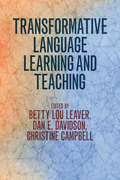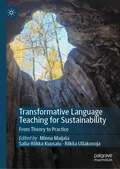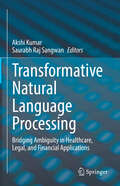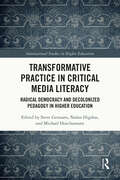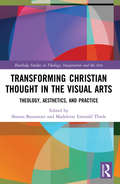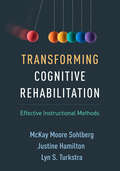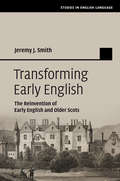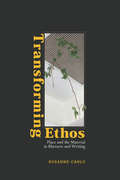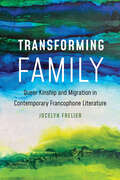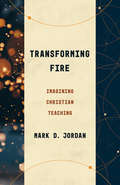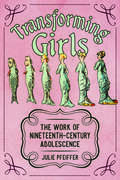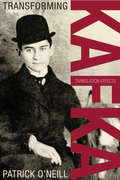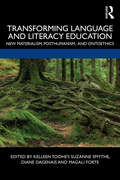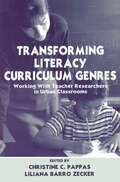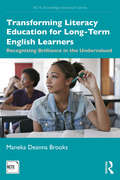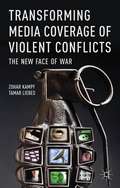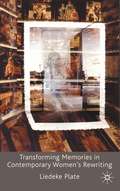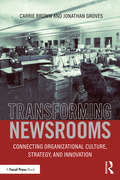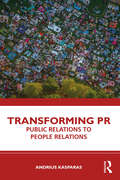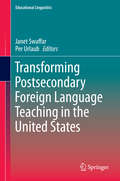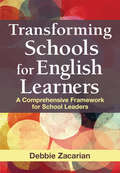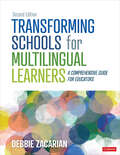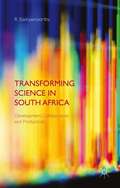- Table View
- List View
Transformative Language Learning and Teaching
by Christine Campbell Betty Lou Leaver Dan E. DavidsonTransformative learning has been widely used in the field of adult education for over twenty years, but until recently has received little attention in the field of world languages. Drawing on best practices and the research of distinguished international world language experts, this volume provides theoretical and classroom-tested models of transformative education in world languages at major university, state and governmental programs. Chapters outline theoretical frameworks and detail successful models from cutting-edge programs in a wide range of languages, with plenty of examples included to make the theory accessible to readers not yet familiar with the concepts. Classroom teachers, program administrators and faculty developers at every level of instruction will find support for their courses. With its innovative approach to the teaching and learning of languages, this volume is a seminal text in transformative language learning that will stimulate discussions and innovation in the language field for years to come.
Transformative Language Teaching for Sustainability: From Theory to Practice
by Riikka Ullakonoja Minna Maijala Salla-Riikka KuusaluThis edited book is centred around the novel didactic model of Transformative Language Teaching for Sustainability. The contributing authors discuss the uses and possibilities of the model, as well as other sustainability-related aspects of language education, such as Education for Sustainable Development, transformative language teaching methods, and ecolinguistics. The book consists of a combination of theoretical review articles and practical research articles drawing on findings from a variety of contexts and educational settings. While there are many practical examples of pedagogical approaches and methods for transformative education for sustainability, this book presents a thorough framework based on academic research, designed to be useful to language teachers, teacher trainers, policy makers, and curriculum designers, as well as academics working in fields such as applied linguistics, language learning, language teaching, language education policy, environmental education, and sustainability education.
Transformative Natural Language Processing: Bridging Ambiguity in Healthcare, Legal, and Financial Applications
by Akshi Kumar Saurabh Raj SangwanThe evolving landscape of technology has presented numerous opportunities for addressing some of the most critical challenges in high-stakes domains such as medicine, law, and finance. These fields, where the stakes are exceptionally high, have increasingly turned to Natural Language Processing (NLP) to manage, interpret, and utilize vast amounts of unstructured linguistic data. The complexities and subtleties inherent in human language pose significant challenges in these sectors, where precision and clarity are paramount. Misinterpretation or ambiguity can lead to far-reaching consequences, making the need for advanced NLP techniques crucial. This book aims to bridge the gap between state-of-the-art NLP technologies and their practical applications in medicine, law, and finance. By focusing on the specific challenges and advancements within these sectors, the publication intends to highlight innovative approaches, methodologies, and technologies that are shaping the future of NLP. It discusses the integration of NLP with other technological advancements, the development of new tools and techniques, and the ethical considerations involved in deploying NLP solutions in high-stakes domains. Moreover, the book provides a platform for researchers, practitioners, and industry experts to share their experiences, insights, and research findings. Through comprehensive reviews, case studies, and empirical research, it covers a range of topics including but not limited to handling uncertainty in clinical notes, approaches for dealing with ambiguity in legal documents, sentiment analysis in financial markets, and ethical considerations in the use of NLP for sensitive data.
Transformative Practice in Critical Media Literacy: Radical Democracy and Decolonized Pedagogy in Higher Education (International Studies in Higher Education)
by Michael Hoechsmann Nolan Higdon Steve GennaroTransformative Practice in Critical Media Literacy brings together a diverse selection of essays to examine the knowledge production crisis in higher education and the role that news media and technology play in this process.This text highlights the importance of radical pedagogy and critical media literacy to fight back and reclaim higher education as the battleground for democracy and the embodiment of citizenship. Using a global and social justice lens, it explores the transformative potential of critical media literacy in higher education. It also provides real examples of current critical media literacy practices around the globe and of successful experiences inside classrooms. In an era of fake news, this text fulfils the yearning for critical media literacy to permeate higher education by drawing together practitioners and scholars speaking to journalism students, teacher candidates, and to students, scholars, and activists across a variety of spaces in higher education.This book will be a key resource for scholars, students, policymakers, community members and activists interested in education, politics, youth studies, critical theory, intersectionality, social justice and peace studies, activism, critical media literacy, communication, or media studies.
Transforming Christian Thought in the Visual Arts: Theology, Aesthetics, and Practice (Routledge Studies in Theology, Imagination and the Arts)
by Sheona Beaumont and Madeleine Emerald ThieleThis volume explores how the visual arts are presenting and responding to Christian theology and demonstrates how modern and contemporary artists and artworks have actively engaged in conversation with Christianity. Modern intellectual enquiry has often been reluctant to engage theology as an enriching or useful form of visual analysis, but critics are increasingly revisiting religious narratives and Christian thought in pursuit of understanding our present-day visual culture. In this book an international group of contributors demonstrate how theology is often implicit within artworks and how, regardless of a viewer’s personal faith, it can become implicit in a viewer’s visual encounter. Their observations include deliberate juxtaposition of Christian symbols, imaginative play with theologies, the validation of non-confessional or secular public engagement, and inversions of biblical interpretation. Case studies such as an interactive Easter, glow-sticks as sacrament, and visualisation of the Bible’s polyphonic voices enrich this discussion. Together, they call for a greater interpretative generosity and more nuance around theology’s cultural contexts in the modern era. By engaging with theology, culture, and the visual art, this collection offers a fresh lens through which to see the interaction of religion and art. As such, it will be of great use to those working in Religion and the Arts, Visual Art, Material Religion, Theology, Aesthetics, and Cultural Studies.
Transforming Cognitive Rehabilitation: Effective Instructional Methods
by McKay Moore Sohlberg Justine Hamilton Lyn S. TurkstraGrounded in cutting-edge knowledge about cognitive function and recovery from brain injury, this practical reference and text builds on the authors' influential earlier work, Optimizing Cognitive Rehabilitation. It incorporates major advances in the field to provide a new framework for assessing patients and developing individualized rehabilitation plans. The distinguished authors present principles and procedures for promoting engagement, teaching cognitive strategies and discrete facts and routines, introducing external cognitive aids, and supporting patients' social competence. Additional topics include considerations for using computer-based training, managing functional cognitive symptoms, and providing cognitive rehabilitation in the inpatient setting. The book features detailed case illustrations and filled-out examples of 19 reproducible planning and progress monitoring forms. Blank forms can be downloaded and printed in a convenient 8 1/2" x 11" size.
Transforming Early English: The Reinvention of Early English and Older Scots (Studies in English Language)
by Jeremy J. SmithTransforming Early English shows how historical pragmatics can offer a powerful explanatory framework for the changes medieval English and Older Scots texts undergo, as they are transmitted over time and space. The book argues that formal features such as spelling, script and font, and punctuation - often neglected in critical engagement with past texts - relate closely to dynamic, shifting socio-cultural processes, imperatives and functions. This theme is illustrated through numerous case-studies in textual recuperation, ranging from the reinvention of Old English poetry and prose in the later medieval and early modern periods, to the eighteenth-century 'vernacular revival' of literature in Older Scots.
Transforming Ethos: Place and the Material in Rhetoric and Writing
by Rosanne CarloIn Transforming Ethos Rosanne Carlo synthesizes philosophy, rhetorical theory, and composition theory to clarify the role of ethos and its potential for identification and pedagogy for writing studies. Carlo renews focus on the ethos appeal and highlights its connection to materiality and place as a powerful instrument for writing and its teaching—one that insists on the relational and multimodal aspects of writing and makes prominent its inherent ethical considerations and possibilities. Through case studies of professional and student writings as well as narrative reflections Transforming Ethos imagines the ethos appeal as not only connected to style and voice but also a process of habituation, related to practices of everyday interaction in places and with things. Carlo addresses how ethos aids in creating identification, transcending divisions between the self and other. She shows that when writers tell their experiences, they create and reveal the ethos appeal, and this type of narrative/multimodal writing is central to scholarship in rhetoric and composition as well as the teaching of writing. In addition, Carlo considers how composition is becoming compromised by professionalization—particularly through the idea of “transfer”—which is overtaking the critical work of self-development with others that a writing classroom should encourage in college students. Transforming Ethos cements ethos as an essential term for the modern practice and teaching of rhetoric and places it at the heart of writing studies. This book will be significant for students and scholars in rhetoric and composition, as well as those interested in higher education more broadly.
Transforming Family: Queer Kinship and Migration in Contemporary Francophone Literature
by Jocelyn FrelierOne of the lasting legacies of colonialism is the assumption that families should conform to a kinship arrangement built on normative, nuclear, individuality-based models. An alternate understanding of familial aspiration is one cultivated across national borders and cultures and beyond the constraints of diasporas. This alternate understanding, which imagines a category of &“trans-&” families, relies on decolonial and queer intellectual thought to mobilize or transform power across borders. In Transforming Family Jocelyn Frelier examines a selection of novels penned by francophone authors in France, Morocco, and Algeria, including Azouz Begag, Nina Bouraoui, Fouad Laroui, Leïla Sebbar, Leïla Slimani, and Abdellah Taïa. Each novel contributes a unique argument about this alternate understanding of family, questioning how family relates to race, gender, class, embodiment, and intersectionality. Arguing that trans- families are always already queer, Frelier opens up new spaces of agency for both family units and individuals who seek representation and fulfilling futures. The novels analyzed in Transforming Family, as well as the families they depict, resist classification and delink the legacies of colonialism from contemporary modes of being. As a result, these novels create trans- identities for their protagonists and contribute to a scholarly understanding of the becoming trans- of cultural production. As international political debates related to migration, the family unit, and the &“global migrant crisis&” surge, Frelier destabilizes governmental criteria for the &“regrouping&” of families by turning to a set of definitions found in the cultural production of members of the francophone, North African diaspora.
Transforming Fire: Imagining Christian Teaching (Theological Education between the Times)
by Mark D. Jordan&“We don&’t need books about teaching so much as books that teach.&” Considering Jesus himself taught in a variety of ways—parable, discussion, miracle performance, ritual observance—it seems that there can be no single, definitive, Christian method of teaching. How then should Christian teaching happen, especially in this time of significant change to theological education as an institution? Mark Jordan addresses this question by first allowing various depictions and instances of Christian teaching from literature to speak for themselves before meditating on what these illustrative examples might mean for Christian pedagogy. Each textual scene he shares is juxtaposed with a contrasting scene to capture the pluralistic possibilities in the art of teaching a faith that is so often rooted in paradox. He exemplifies forms of teaching that operate beyond the boundaries of scholarly books and discursive lectures to disrupt the normative Western academic approach of treating theology as a body of knowledge to be transmitted merely through language. Transforming Fire consults writers ranging from Gregory of Nyssa to C. S. Lewis, and from John Bunyan to Octavia Butler, cutting across historical distance and boundaries of identity. Rather than offering solutions or systems, Jordan seeks in these texts new shelters for theological education where powerful teaching can happen and—even as traditional institutions shrink or vanish—the hearts of students can catch fire once again.
Transforming Gender and Emotion: The Butterfly Lovers Story in China and Korea
by Sookja ChoThe Butterfly Lovers Story, sometimes called the Chinese Romeo and Juliet, has been enduringly popular in China and Korea. In Transforming Gender and Emotion, Sookja Cho demonstrates why the Butterfly Lovers Story is more than just a popular love story. By unveiling the complexity of themes and messages concealed beneath the tale’s modern classification as a tragic love story, this book reveals the tale as a rich academic subject for students of human emotions and relationships, comparative geography and culture, and narrative adaptation. By examining folk beliefs and ideas that abound in the narrative—including rebirth and a second life, the association of human souls and butterflies, and women’s spiritual power—this book presents the Butterfly Lovers Story as an example of local religious narrative. The book’s cross-cultural comparisons, best manifested in its discussion of a shamanic ritual narrative version from the Cheju Island of Korea, frame the story as a catalyst for inclusive, expansive discussion of premodern Korean and Chinese literatures and cultures. This scrutiny of the historical and cultural background behind the formation and popularization of the Cheju Island version sheds light on important issues in the Butterfly Lovers Story that are not frequently discussed—either in past examinations of this particular narrative or in the overall literary studies of China and Korea. This new, open approach presents an innovative framework for understanding premodern literary and cultural space in East Asia.
Transforming Girls: The Work of Nineteenth-Century Adolescence (Children's Literature Association Series)
by Julie PfeifferTransforming Girls: The Work of Nineteenth-Century Adolescence explores the paradox of the nineteenth-century girls’ book. On the one hand, early novels for adolescent girls rely on gender binaries and suggest that girls must accommodate and support a patriarchal framework to be happy. On the other, they provide access to imagined worlds in which teens are at the center. The early girls’ book frames female adolescence as an opportunity for productive investment in the self. This is a space where mentors who trust themselves, the education they provide, and the girl’s essentially good nature neutralize the girl’s own anxieties about maturity. These mid-nineteenth-century novels focus on female adolescence as a social category in unexpected ways. They draw not on a twentieth-century model of the alienated adolescent, but on a model of collaborative growth. The purpose of these novels is to approach adolescence—a category that continues to engage and perplex us—from another perspective, one in which fluid identity and the deliberate construction of a self are celebrated. They provide alternatives to cultural beliefs about what it was like to be a white, middle-class girl in the nineteenth century and challenge the assumption that the evolution of the girls’ book is always a movement towards less sexist, less restrictive images of girls. Drawing on forgotten bestsellers in the United States and Germany (where this genre is referred to as Backfischliteratur), Transforming Girls offers insightful readings that call scholars to reexamine the history of the girls’ book. It also outlines an alternate model for imagining adolescence and supporting adolescent girls. The awkward adolescent girl—so popular in mid-nineteenth-century fiction for girls—remains a valuable resource for understanding contemporary girls and stories about them.
Transforming Kafka
by Patrick O'NeillLyrical, mysterious, and laden with symbolism, Franz Kafka's novels and stories have been translated into more than forty languages ranging from Icelandic to Japanese. In Transforming Kafka, Patrick O'Neill approaches these texts through the method he pioneered in Polyglot Joyce and Impossible Joyce, considering the many translations of each work as a single, multilingual "macrotext."Examining three novels - The Trial, The Castle, and America - and two short stories - "The Judgment" and "The Metamorphosis" - O'Neill offers comparative readings that consider both intertextual and intratextual themes. His innovative approach shows how comparing translations extends and expands the potential meanings of the text and reveals the subtle differences among the hundreds of translations of Kafka's work. A sophisticated analysis of the ways in which translation shapes, rearranges, and expands our understanding of literary works, Transforming Kafka is a unique approach to reading the works of a literary giant.
Transforming Language and Literacy Education: New Materialism, Posthumanism, and Ontoethics
by Kelleen TooheyThe field of languages and literacies education is undergoing rapid transformation. Scholarship that draws upon feminist, post-colonial, new material and posthuman ontologies is transcending disciplinary boundaries and disrupting traditional binaries between human and nonhuman, the natural and the cultural, the material and the discursive. In Transforming Language and Literacy Education, editors Kelleen Toohey, Suzanne Smythe, Diane Dagenais and Magali Forte bring together accessible, conceptually rich stories from internationally diverse authors to guide new practices, new conversations and new thinking among scholars and educators at the forefront of languages and literacies learning. The book addresses these concepts for diverse groups of learners including young children, youth and adults in formal educational and community-based settings. Challenging and disruptive, this is a unique and important contribution to language and literacy education.
Transforming Literacy Curriculum Genres: Working With Teacher Researchers in Urban Classrooms
by Christine C. Pappas Liliana ZeckerIn this volume, university researchers and urban elementary teacher-researchers coauthor chapters on the teachers' year-long inquiries, on a range of literacy topics that they conducted as part of a collaborative school-university action research project. Central to this project was the teacher-researchers' attempts to transform their teaching practices to meet the needs of students from diverse ethnic and linguistic backgrounds, and their finding that their inquiry efforts resulted in developing more collaborative styles of teaching. Because the everyday interactions between teachers and students are realized by the social talk in the classroom, the university- and teacher-researchers analyzed classroom discourse to study and document the teachers' efforts to make changes in the locus of power in literacy teaching and learning. The chapters include many classroom discourse examples to illustrate the critical points or incidents of these teachers' inquiries. They show the successes and the struggles involved in shedding teacher-controlled patterns of talk. This book explores the process of urban teachers' journeys to create dialogically organized literacy instruction in particular literacy routines--called, in this book, curriculum genres. The book is organized in terms of these curriculum genres, such as writing curriculum genres, reading-aloud curriculum genres, drama curriculum genres, and so forth. Teacher inquiries were conducted in various elementary grade levels, from kindergarten through grade eight. Three occurred in bilingual classrooms and one in a special education classroom. The first and last chapters, written by the editors, provide the background, theoretical, and methodological underpinnings of the project.
Transforming Literacy Education for Long-Term English Learners: Recognizing Brilliance in the Undervalued (NCTE-Routledge Research Series)
by Maneka Deanna BrooksGrounded in research on bilingualism and adolescent literacy, this volume provides a much-needed insight into the day-to-day needs of students who are identified as long-term English language learners (LTELs). LTELs are adolescents who are primarily or solely educated in the U.S. and yet remain identified as "learning English" in secondary school. Challenging the deficit perspective that is often applied to their experiences of language learning, Brooks counters incorrect characterizations of LTELs and sheds light on students’ strengths to argue that effective literacy education requires looking beyond policy classifications that are often used to guide educational decisions for this population. By combining research, theory, and practice, this book offers a comprehensive analysis of literacy pedagogy to facilitate teacher learning and includes practical takeaways and implications for classroom practice and professional development. Offering a pathway for transforming literacy education for students identified as LTELs, chapters discuss reframing the education of LTELs, academic reading in the classroom, and the bilingualism of students who are labeled LTELs. Transforming Literacy Education for Long-Term English Learners is a much-needed resource for scholars, professors, researchers, and graduate students in language and literacy education, English education, and teacher education, and for those who are looking to create an inclusive and successful classroom environment for LTELs.
Transforming Media Coverage of Violent Conflicts
by Zohar Kampf Tamar LiebesWhat links the interviews with Saddam Hussein and Mahmoud Ahmadinejad on British and American TV, the chase of journalists following mega-terrorists, and the new status conferred on ordinary people at war? Transforming Media Coverage of Violent Conflicts offers a timely and original discussion on the shift in war journalism in recent years.
Transforming Memories in Contemporary Women’s Rewriting
by Liedeke PlateIncluding topics as diverse as feminism and its relationship to the marketplace, plagiarism and copyright, silence and forgetting, and myth in a digital age, this book explores the role of rewriting within feminist literature from the 1970s onwards in relation to the theme of cultural memory.
Transforming Newsrooms: Connecting Organizational Culture, Strategy, and Innovation
by Carrie Brown Jonathan GrovesTransforming Newsrooms offers a practical guide to navigating structural and culture change for news organizations facing economic disruption in today’s rapidly changing media landscape. Even when the need for change is obvious, the best ideas and intentions are often not followed by successful execution. This book offers a road map for understanding the obstacles to change in news organizations and how to overcome them. Providing a detailed overview of the ways in which news processes and routines are being fundamentally altered to meet new demands for multimedia, interactivity, and immediacy, the book offers tips to help news organizations better serve communities by understanding what information people need and how they want to engage and collaborate. The book also features a variety of case studies and examples from news organizations of all kinds, including a 10-year in-depth investigation of the Christian Science Monitor, the first national news organization to stop its daily presses for a digital report. Transforming Newsrooms is an invaluable resource for students and media professionals alike, demonstrating how to make research on organizational change actionable and help build a more equitable journalism model that will survive and thrive when we need it most.
Transforming PR: Public Relations to People Relations
by Andrius KasparasThis book introduces the concept of the Picnic Society – a society which we all belong to today because social media has given us unlimited opportunities to create or destroy our own and our circle’s (our bubble’s) realities, possibilities, and reputations.In today’s world every organization is integrated into society, and the people belonging to organizations are integrated into various continually interacting communities. Social media has – or soon will – erase any remaining boundaries between organizations and the world’s social fabric. It is increasingly pointless for organizations to try to establish relationships with society, because these already exist – 24 hours per day, 7 days per week, and all 365 days of the year. This is what I mean in talking about the transformation of the field of PR – from Public Relations to People Relations. This book discusses the challenges facing public relations professionals working in a contemporary society that is flooded with information, offers endless channels of communication, gives rise to true and false leaders, and is marked by both openness and mistrust, by real and fake news.This book will appeal to professionals who already have a solid grasp of public relations technologies but would like to review their skills and develop their own model of public relations know-how without being limited by the strict boundaries of traditional PR theory.
Transforming Postsecondary Foreign Language Teaching in the United States
by Janet Swaffar Per UrlaubThis volume addresses critical challenges and issues facing foreign language departments in colleges and universities across the U. S. It presents the insights of individuals who have built or are in the process of building foreign language curricula during a major transition period in postsecondary institutions. The authors of this volume come from various language departments and institutional experience from across the U. S. , including private and public postsecondary foreign language teachers, researchers and administrators. The chapters address issues and provide templates for curricular change at all learning levels. The five sections of this book explore: Changing Perceptions about Foreign Language Learning; The Case for a Multi-literacy FL Curriculum in Concept and Assessment Praxis; Curricular Transformations: Historical Hurdles and Faculty Heuristics; Rethinking the Graduate Curriculum; Foreign Languages' Integration into the Interdisciplinary University. "This thought-provoking and timely volume addresses the question of how historic and current disciplinary, institutional and political conditions affect curricular transformation in collegiate foreign language programs. Responding to the issues raised in the 2007 MLA Report, this collection of nine essays presents a diversity of curricular models and approaches from different theoretical perspectives focusing on the integration of language and content. The book will undoubtedly be of great interest to a broad audience, such as foreign language educators, curriculum designers, administrators, graduate students and researchers. " Nelleke Van Deusen-Scholl, Yale College, CT, USA.
Transforming Schools for English Learners: A Comprehensive Framework for School Leaders
by Debbie ZacarianPosition your school to successfully teach English learners Could your school be more effective at instructing its English learners? Whether you are just beginning to work with an emergent population or need to improve your program, this book provides a comprehensive framework for improving ELs’ academic performance and school engagement through visionary planning of EL education programming. The author addresses such critical topics as: Selecting the appropriate program model for your school Creating effective student course schedules for language development and content Making data-driven decisions using effective measures of student performance learning Effectively using Response to Intervention (RTI)
Transforming Schools for Multilingual Learners: A Comprehensive Guide for Educators
by Debbie ZacarianEssential principles, practices, and structures for multilingual learners Much has changed in the ten years since this book was first published. A celebrated triumph, it provided state, district, school, and teacher leaders with a comprehensive guide to support multilingual learners to reach their full potential. From selecting the appropriate program model to partnering with families and infusing federal and state laws governing the education of multilingual learners and the rights of their families into all we do, the key messages that made the first edition of this book a renowned success have been re-examined in the second edition with a robust lens to meet these demanding times. This second edition supports educators to design and enact policies, practices, and structures for multilingual learners (MLs) to feel a sense of safety, belonging, value, and competence. Topics explored in the book include: a discussion of the changes to federal and state policies and their impact on MLs and their families strategies to move from a deficit- to an asset-based approach that values multilingualism nine principles to design and deliver high-quality lessons in multiple languages and across disciplines practices to identify and support MLs with learning differences and disabilitiessteps for building long-lasting family-school partnerships Reflecting changing trends in leadership, this new edition supports superintendents, principals, curriculum supervisors, coaches, mentors, teachers, and other stakeholders in their collaborative efforts to create and sustain successful language assistance programs.
Transforming Schools for Multilingual Learners: A Comprehensive Guide for Educators
by Debbie ZacarianEssential principles, practices, and structures for multilingual learners Much has changed in the ten years since this book was first published. A celebrated triumph, it provided state, district, school, and teacher leaders with a comprehensive guide to support multilingual learners to reach their full potential. From selecting the appropriate program model to partnering with families and infusing federal and state laws governing the education of multilingual learners and the rights of their families into all we do, the key messages that made the first edition of this book a renowned success have been re-examined in the second edition with a robust lens to meet these demanding times. This second edition supports educators to design and enact policies, practices, and structures for multilingual learners (MLs) to feel a sense of safety, belonging, value, and competence. Topics explored in the book include: a discussion of the changes to federal and state policies and their impact on MLs and their families strategies to move from a deficit- to an asset-based approach that values multilingualism nine principles to design and deliver high-quality lessons in multiple languages and across disciplines practices to identify and support MLs with learning differences and disabilitiessteps for building long-lasting family-school partnerships Reflecting changing trends in leadership, this new edition supports superintendents, principals, curriculum supervisors, coaches, mentors, teachers, and other stakeholders in their collaborative efforts to create and sustain successful language assistance programs.
Transforming Science in South Africa
by R. SooryamoorthyThis book is essential for anyone interested in knowing how science works nationally and internationally in the contemporary world. It offers a comprehensive analysis of scientific collaboration and its relation to development and the productivity of scientists, with specific reference to South Africa in both the past and the present.
